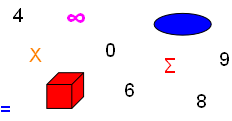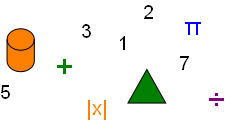



Subtracting Numbers


Subtraction is the application of established properties, rules and methods to reduce the sum of numeric quantity. Simple integer subtraction only considers positive whole numbers, but the result can be negative, zero or positive.
Subtraction Rules and Properties

Single Digit Subtraction
1 − 1 = 0
7 − 5 = 2
9 − 1 = 8
6 − 0 = 6
−1 − 1 = −2
−7 − 5 = −12
−9 − 1 = −10
−6 − 0 = −6
Six apples and six oranges is not a dozen of either apples or oranges. We do not sum or subtract items that are not the same. We could be interested in the total number of apples and oranges if they were combined. Like the same box or bag, to make sure the container is large enough for all items.
Double Digit Subtraction
2 digit subtraction when one or more numbers is 2 digits.
34
− 27
7
Can be written or expressed as: 34 − 27 = 7
Without subtraction borrowing:
30 − 20 = 10
04 − 07 = −3
34 − 27 = 7
We must work with the −3 value
(10 − 3) to determine the answer.
Without subtraction borrowing:
(30 − 10) − 20 = 20 − 20 = 0
(10 + 04) − 07 = 14 − 07 = 7
34 − 27 = 7
When subtracting 7 from 4, (4 − 7), it results in −3 (as shown above). Recognizing the result is negative we “borrow” 1 from the nearest left column. Each 1 that is borrowed from the nearest left column has a value 10 times greater than the column that is borrowing. The ten is added to 4 resulting in the value of 14, (10 + 4).
49
− 7
− 83
− 41
Can be expressed as: 49 − 7 − 83 = − 41
40
9
49
−
−
−
0
7
7
−
−
−
80
3
83
=
=
=
−40
−1
−41
Group numbers to be subtracted using parenthesis:
(49 − 7) − 83 = 42 − 83 = −41
40
2
42
−
−
−
80
3
83
=
=
=
−40
−1
−41
3 Digit Subtraction
Three digit subtraction - one or more numbers is 3 digits.
125
− 362
− 839
−1,076
Can be expressed as: 125 − 362 − 839 = −1,076
Without grouping numbers:
100
20
5
125
−
−
−
−
300
60
2
362
−
−
−
−
800
30
9
839
=
=
=
=
−1000
−70
−6
−1,076
Group numbers to be subtracted using parenthesis:
(125 − 362) − 839 = −1,076
100
20
5
(125
−
−
−
−
300
60
2
362)
=
=
=
=
−200
40
3
−237
(−237) − 839 = −1,076
−200
−30
−7
−237
−
−
−
−
800
30
90
839
=
=
=
=
−1000
−60
−16
−1,076
Copyright © DigitMath.com
All Rights Reserved.